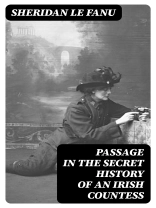In ‘Passage in the Secret History of an Irish Countess, ‘ Sheridan Le Fanu intricately weaves a tale that explores the themes of identity, secret histories, and moral ambiguities within the elegant confines of the Irish gentry. The narrative is marked by Le Fanu’s characteristic style, blending gothic elements with a psychological depth that invites readers into the intimate world of its protagonists. Set against the historical backdrop of 19th-century Ireland, the novella employs rich, atmospheric prose and engaging dialogue, delving into the complexities of gender and power. Le Fanu’s storytelling not only captivates but also prompts reflection on the societal constraints faced by women of the time, making this work a significant contribution to gothic literature and historical fiction. Sheridan Le Fanu, an Irish author known for his mastery of the supernatural, garnered inspiration from the tumultuous socio-political landscape of his homeland, marked by the tensions of class and gender. His personal background, intertwined with the decline of the Anglo-Irish aristocracy, informs the character-driven narratives that are emblematic of his oeuvre. Le Fanu’s exploration of hidden truths and eerie revelations reflects both his fascination with the mystique of Irish folklore and his deep understanding of human psychology. I highly recommend ‘Passage in the Secret History of an Irish Countess’ to readers who appreciate rich historical narratives intertwined with psychological insights. This novella not only showcases Le Fanu’s literary prowess but also serves as an evocative exploration of the hidden lives of women in a changing society. Its elegant prose and haunting themes will resonate with anyone intrigued by the depths of human experience.
عن المؤلف
Joseph Thomas Sheridan Le Fanu (1814-1873) stands as a seminal figure in Victorian literature, particularly renowned for his contributions to the gothic and horror genres. Hailing from a literary family in Dublin, Le Fanu embarked on a career that melded his interests in journalism and fiction writing. As a writer, Le Fanu excelled in creating an atmosphere of suspense and the supernatural, coupled with a deep understanding of the psychological landscape of his characters. His novella ‘Passage in the Secret History of an Irish Countess’ is but a single example of his mastery in brooding narratives and subtle horror. Le Fanu’s innovative storytelling is often characterized by his use of the uncanny and the exploration of the fears and anxieties of the Irish gentry and middle classes. Among his most celebrated works is ‘Uncle Silas’ (1864), a darkly Gothic mystery that cemented his reputation as a pioneer of the ghost story. Another noteworthy book, ‘Carmilla’ (1872), precedes Bram Stoker’s ‘Dracula’ and stands as an important work in vampire fiction. Le Fanu’s nuanced character development and moody, layered settings have earned him critical acclaim and a lasting legacy within the annals of horror and supernatural literature. His writing style has influenced a wide range of authors and filmmakers, ensuring his place as a cornerstone of the gothic tradition.












